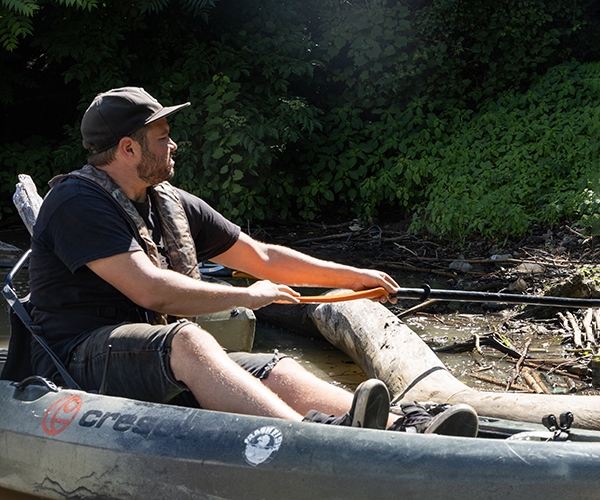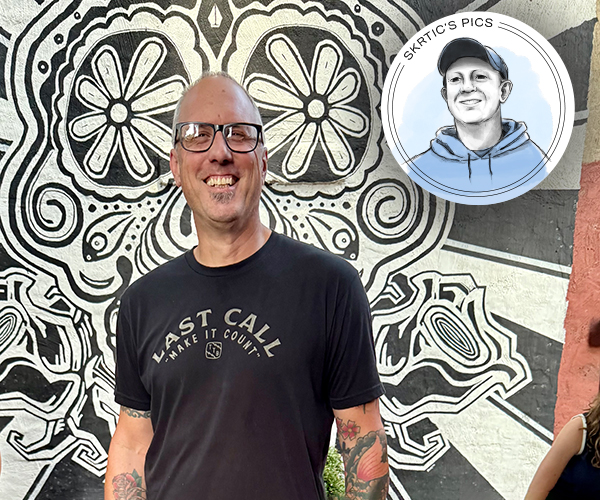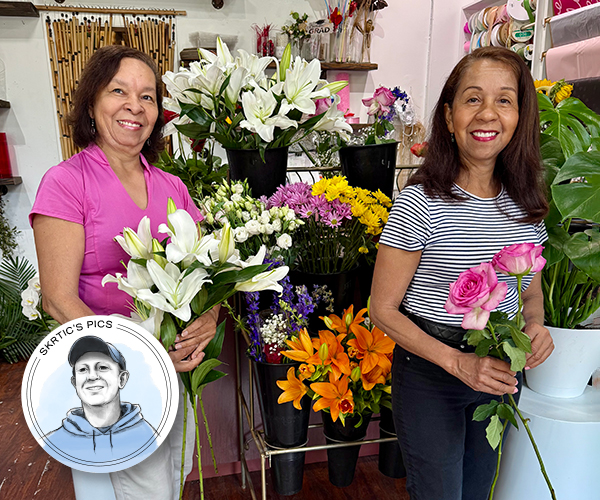This was the 13th year I went. One of our New York sisters, Claire O’Mara, got arrested in 1995 at Fort Benning. It was the first time I had heard about the protest, and I wanted to meet her. She didn’t even know Dorothy. I wanted to know why she got arrested and how she had the courage. I had a wonderful conversation with her, and I went down the next year.
Around that time, the Ursulines all took a year of study and decided we wanted to take a stance. The idea was to keep doing actions so that we could close Fort Benning’s School of the Americas, where these soldiers were trained. Some people wrote letters, some went to Washington D.C. to lobby our representatives, and some went to this demonstration. We each did what we felt called to do.
I decided my action would be to attend the Fort Benning protest every year. Nine years ago, I was arrested for the first time.
I asked a group of seven people to begin praying with me, to make sure this wasn’t something that was completely outlandish. I prayed every morning for two hours trying to make sure these annual protests were the right thing to do, to understand how to be nonviolent, to completely get that mindset and that focus.
Last November, nearly 28 years since that awful day Dorothy was murdered, I once again returned to Fort Benning.
We walked on an early Sunday morning. It was cool, not real cold, and we started maybe a mile from the base’s front gate. It’s a beautiful area. It used to be a Southern plantation. On either side is beautiful country, all wooded. A large group was protesting, but only a few of us planned on getting arrested. There were six of us, plus one man in a wheelchair with a prosthetic leg. He couldn’t walk, so we wheeled him.
We didn’t get to the main gate. We were arrested for trespassing after marching about half a mile up the driveway toward the base.
It was very peaceful. There were a lot of flashing lights and a lot of people and military police. The local police were there, too. All I can remember is the peace I felt. I knew this was the right thing to do. It was a quiet sense of knowing that I was doing what I was supposed to be doing.
I’m 63, so all of the MPs seemed very young to me. They could have been my sons. They were very gentle. They didn’t want to put handcuffs on me, but they said they had to. They were not harsh.
I never watch football or anything, but there had been a game on the night before — it was Notre Dame, I think.
One of the MPs was a little nervous. So right as he was putting the handcuffs on, he said, “Did you see that game last night?” and I said, “I saw the tail end of it.” And right away, everybody started relaxing. We were human beings. Everybody was just doing their job. As soon as we engaged each other as humans, it was absolutely peaceful.
One of the women with me, she started singing religious songs. She was kneeling on the ground and holding a cross. She decided to sing through the arrest, and I decided to make conversation through it.
I believe in engaging each human, looking them in the eye and talking to them. That’s how you begin to see each person as an individual. That’s how you communicate peace. -- as told to Chuck Bowen
Around that time, the Ursulines all took a year of study and decided we wanted to take a stance. The idea was to keep doing actions so that we could close Fort Benning’s School of the Americas, where these soldiers were trained. Some people wrote letters, some went to Washington D.C. to lobby our representatives, and some went to this demonstration. We each did what we felt called to do.
I decided my action would be to attend the Fort Benning protest every year. Nine years ago, I was arrested for the first time.
I asked a group of seven people to begin praying with me, to make sure this wasn’t something that was completely outlandish. I prayed every morning for two hours trying to make sure these annual protests were the right thing to do, to understand how to be nonviolent, to completely get that mindset and that focus.
Last November, nearly 28 years since that awful day Dorothy was murdered, I once again returned to Fort Benning.
We walked on an early Sunday morning. It was cool, not real cold, and we started maybe a mile from the base’s front gate. It’s a beautiful area. It used to be a Southern plantation. On either side is beautiful country, all wooded. A large group was protesting, but only a few of us planned on getting arrested. There were six of us, plus one man in a wheelchair with a prosthetic leg. He couldn’t walk, so we wheeled him.
We didn’t get to the main gate. We were arrested for trespassing after marching about half a mile up the driveway toward the base.
It was very peaceful. There were a lot of flashing lights and a lot of people and military police. The local police were there, too. All I can remember is the peace I felt. I knew this was the right thing to do. It was a quiet sense of knowing that I was doing what I was supposed to be doing.
I’m 63, so all of the MPs seemed very young to me. They could have been my sons. They were very gentle. They didn’t want to put handcuffs on me, but they said they had to. They were not harsh.
I never watch football or anything, but there had been a game on the night before — it was Notre Dame, I think.
One of the MPs was a little nervous. So right as he was putting the handcuffs on, he said, “Did you see that game last night?” and I said, “I saw the tail end of it.” And right away, everybody started relaxing. We were human beings. Everybody was just doing their job. As soon as we engaged each other as humans, it was absolutely peaceful.
One of the women with me, she started singing religious songs. She was kneeling on the ground and holding a cross. She decided to sing through the arrest, and I decided to make conversation through it.
I believe in engaging each human, looking them in the eye and talking to them. That’s how you begin to see each person as an individual. That’s how you communicate peace. -- as told to Chuck Bowen



